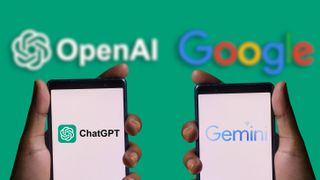Open AI plans to steal Google’s thunder by announcing an AI-powered search engine one day before Google I/O 2024 — report
OpenAI will reportedly announce an AI-powered search product one day before Google's Gemini AI

According to Reuters, OpenAI is planning a May 13 announcement about its AI-powered search engine that will take on Google Search. Open AI’s statement is expected to occur one day before Google I/O 2024, when many anticipate that Google’s own Gemini AI model will take center stage.
Bloomberg has previously reported from its sources that OpenAI is developing a web search feature for ChatGPT that will deliver sources alongside its results. ChatGPT can already search the web for information and return somewhat accurate results; however, its service is limited to paying GPT-4 subscribers only.
OpenAI took everyone by surprise by launching ChatGPT in November 2022. And since Microsoft was its financial backer, the company planned to announce ChatGPT’s integration with Bing to create Bing Chat on February 7, 2023. This seemed to have shaken Google to its core, especially as an AI-powered search engine will gravely threaten its near monopoly on the online search business.
So, on February 6, 2023, Google launched its generative AI chatbot, Bard, to one-up Microsoft. However, this move backfired, as many considered the Bard launch underwhelming, with the AI chatbot making a significant mistake on the live broadcast.
More than one year after these events, Microsoft and Google’s generative AI chatbots have made significant strides. Today, Bing Chat is now called Microsoft Copilot and is integrated into Windows and Edge, allowing you to use it on your computer and smartphone (provided you have Microsoft Edge installed). Microsoft is also now offering subscriptions with Microsoft Copilot Pro, which integrates it into select Microsoft 365 apps and allows it to generate images and enhance them through Designer.
On the other hand, Bard is now called Gemini AI, and Google offers the Google One AI Premium plan so users can use it in the Google Docs office suite. Although we don’t foresee any major announcements about Gemini AI during this year’s Google I/O 2024, we still expect Google to focus on Gemini and its capabilities during the conference.
OpenAI’s surprise announcement mirrors what Google did to Microsoft one year prior. This back-and-forth between the two tech giants shows us how they see AI as the future of search. Researchers estimate that the generative AI industry will be worth $1.3 trillion by 2032. Perplexity AI, a startup that focuses on search engines and is targeting Google, is currently valued at $1 billion, giving credence to the projections.
Stay On the Cutting Edge: Get the Tom's Hardware Newsletter
Get Tom's Hardware's best news and in-depth reviews, straight to your inbox.
We still don’t know for sure what OpenAI plans to announce on May 13 or even if it will push through with it. All we know is that it will be an AI-powered search engine that will compete with Google. Let’s just wait and see what happens on the appointed date and how Google reacts to it.

China firms' AI breakthrough can meld GPUs from different brands into one training cluster — Baidu says new tech fuses thousands of GPUs together to help sidestep shortages

Microsoft offers to relocate nearly 10% of China-based staffers to the US or allied nations — AI and cloud engineering exodus from China begins
-
edzieba Great, a search engine that will be even worse at actually finding the web page you want rather than a page of random garbage listicles the engine thinks you might want.Reply -
Notton Google search fills the first 1~2 pages with AI-written useless trash sites that don't have the relevant info I'm looking for.Reply
If it can filter that stuff out, it'd be an easy win. -
jp7189 From a different perspective: I put Windows copilot on my aging mother 's computer and we both love it. Her because she doesn't have to dig through pages looking for information, and me because she can't install malware through copilot results.Reply -
edzieba Reply
This, ladies and gentlemen, is what is known as 'foreshadowing'.jp7189 said:because she can't install malware through copilot results. -
rluker5 I thought MS was the first with this using Open-AI with Bing & Edge.Reply
To use it you just click the copilot button on any search. You can even turn it off for now to avoid the space taking AI opinion rant.
I don't think Open-AI competing will matter much though. It doesn't matter how much better the search engine is, most people just use Google because it is name brand or cool or something.
Google has been less than the best in search effectiveness at least since the advent of Bing, possibly longer. They are still the most used. -
TerryLaze Wasn't microsoft' copilot introduced like months ago?? That does websearches right?!Reply
Most Popular



